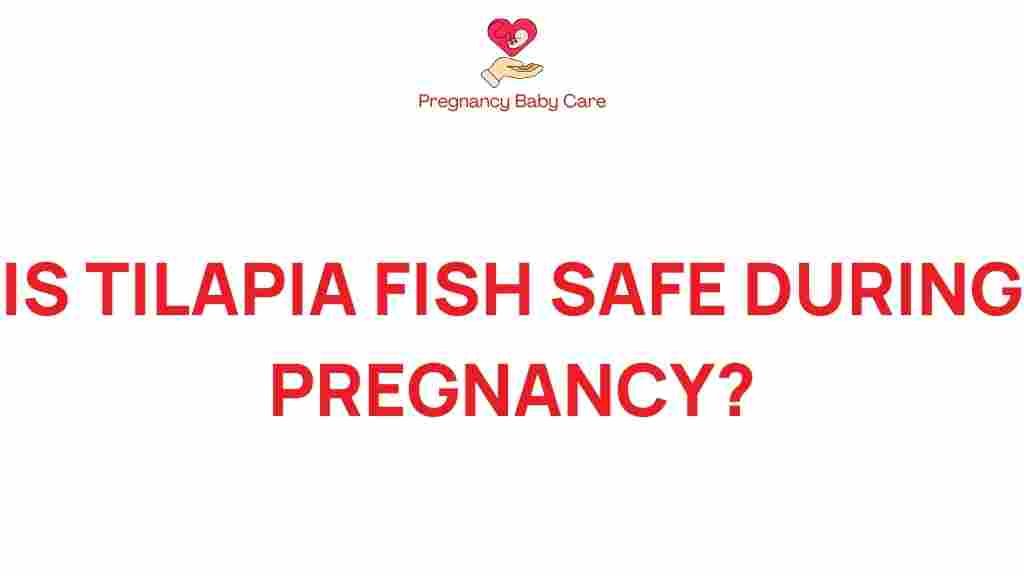Is Tilapia Fish a Safe Choice for Expecting Mothers?
During pregnancy, maintaining a balanced diet is crucial for both maternal health and the developing fetus. One common question that arises is whether certain types of seafood, like tilapia, are safe for expecting mothers. This article delves into the nutritional benefits of tilapia, examines seafood safety, and provides insights into how it fits into pregnancy nutrition.
Understanding Tilapia and Its Nutritional Value
Tilapia is a freshwater fish known for its mild flavor and flaky texture. It is widely available and often considered a healthy option for seafood lovers. Here are some key nutritional benefits of tilapia:
- Low in Calories: Tilapia is a low-calorie fish, making it a great choice for healthy eating.
- High in Protein: It provides a good source of protein, which is essential for the growth and development of the baby.
- Omega-3 Fatty Acids: While tilapia is not as high in omega-3s as fatty fish like salmon, it still contains some beneficial fats.
- Vitamins and Minerals: Tilapia is rich in B vitamins, phosphorus, and selenium, all of which are important for pregnancy nutrition.
Seafood Safety During Pregnancy
When considering fish during pregnancy, seafood safety is a primary concern. Pregnant women must be cautious about the types of fish they consume due to the potential presence of harmful substances such as mercury. Here are some guidelines to ensure safety:
- Choose Low-Mercury Fish: Tilapia is considered a low-mercury fish, making it a safer choice compared to higher-mercury options like shark or swordfish.
- Cook Thoroughly: It is crucial to cook tilapia properly to eliminate any harmful bacteria or parasites. Aim for an internal temperature of 145°F (63°C).
- Limit Consumption: While tilapia is safe, moderation is key. Pregnant women should limit their intake of fish to 2-3 servings per week.
Incorporating Tilapia into a Healthy Pregnancy Diet
Integrating tilapia into your diet during pregnancy can be an enjoyable and nutritious choice. Here’s how you can do it safely:
- Preparation Methods: Opt for grilling, baking, or steaming tilapia instead of frying to keep it healthy.
- Pair with Vegetables: Serve tilapia with a side of steamed vegetables or a fresh salad to enhance nutrient intake.
- Flavor Wisely: Use herbs and spices to flavor your tilapia without excessive salt, which is beneficial for blood pressure management.
Addressing Common Concerns About Tilapia
Many expecting mothers have concerns regarding the safety of consuming tilapia. Here are some common questions answered:
Is all tilapia safe to eat during pregnancy?
Not all tilapia is created equal. Sourcing tilapia from reputable suppliers ensures that it meets safety standards. Look for tilapia that is farmed sustainably and free from harmful chemicals.
Can I eat tilapia if I have seafood allergies?
If you have a known seafood allergy, it’s best to avoid tilapia altogether. Consult with your healthcare provider for alternatives that fit your dietary restrictions.
What are the alternatives to tilapia?
If you are unsure about tilapia, consider other low-mercury fish options like:
- Salmon
- Sardines
- Trout
- Canned light tuna
Dietary Guidelines for Fish Consumption During Pregnancy
According to the U.S. Dietary Guidelines, pregnant women should consume a variety of fish to ensure they receive adequate nutrients. Here are some recommendations:
- Variety is Key: Incorporate different types of fish into your diet to benefit from a range of nutrients.
- Monitor Portions: A serving size is typically 4-6 ounces. Keep track of your weekly intake to avoid overconsumption.
- Stay Informed: Be aware of local advisories regarding fish caught in your area, especially concerning mercury levels.
Importance of Omega-3 Fatty Acids in Pregnancy
Omega-3 fatty acids play a significant role in the healthy development of the fetus, particularly for brain and eye development. While tilapia contains some omega-3s, it’s beneficial to include other sources as well:
- Fatty Fish: Salmon, mackerel, and sardines are rich in omega-3s.
- Plant-Based Sources: Consider flaxseeds, chia seeds, and walnuts for omega-3s if you prefer plant-based options.
Tips for Prenatal Care and Healthy Eating
Maintaining proper prenatal care involves more than just dietary choices. Here are some tips for expecting mothers to ensure a healthy pregnancy:
- Regular Check-Ups: Schedule regular visits with your healthcare provider to monitor your health and your baby’s development.
- Stay Hydrated: Drink plenty of water to support overall health and digestion.
- Exercise Wisely: Engage in moderate exercise, with your doctor’s approval, to promote physical fitness.
- Avoid Processed Foods: Limit intake of processed and sugary foods to maintain a balanced diet.
Conclusion
In conclusion, tilapia can be a safe and nutritious choice for expecting mothers when consumed properly. Its low mercury levels, high protein content, and essential vitamins make it a favorable option in pregnancy nutrition. However, it’s crucial to be mindful of seafood safety guidelines and to consume a variety of fish to ensure you’re getting all the necessary nutrients. Always consult with your healthcare provider when making dietary decisions during pregnancy to support both your health and your baby’s development.
For more information on healthy eating during pregnancy, visit this resource.
This article is in the category Pregnancy and created by PregnancyBabyCare Team
